Icy Sedgwick's Blog, page 85
February 27, 2013
Northern Spaces: Lighthouses

I was having a Twitter conversation on Sunday about what writers should actually blog about. I've seen a few people, both on Twitter and various blogs, asking writers not to blog about writing. It does get repetitive, I suppose, and I guess there are so many blogs about writing you have to wonder how you can do anything new with the topic. Trouble is, what would you blog about instead? Some advice suggests you should let readers get to know you, so blog about your life. I'm too private, I guess, and I'm not sure how interesting my life would be to others. Other people recommend you blog about things related to your fiction - so if you write sports fiction, you blog about sports. If you have a protagonist who's an anthropologist, you can blog about anthropology. Hm. Well my WiP is about mummies so should I blog about necromancy?
Instead, I decided I'd start using the topics of my PhD thesis as a starting point for discussions. One of the things I'm looking at is the representation of space in horror films, so I thought, "Hang on, there are some fantastic spaces where I live!" I figured I'd share some of them with you - so today, I'm looking at lighthouses.
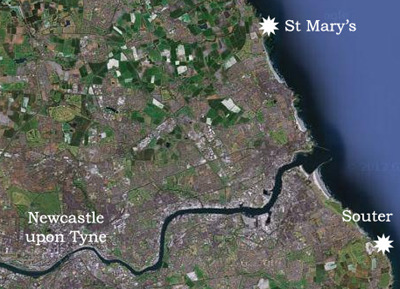
Lighthouses are strange places at the best of times. They're often isolated from the mainland, accessible only at given times of day when the tide hasn't covered the causeway, and by implication they become very lonely places. They were inhabited by lighthouse keepers, but the function of the lighthouse was as a workplace, not a dwelling, so the intention overrides the domesticity of the space. It's further confused by the fact that 'lighthouse' implies a dwelling through the name 'house', but the addition of 'light' implies that the building is where the light lives, not the keeper. I suppose this makes sense for automated lighthouses which have no keepers, but by humanising the light and assigning it a home, it marginalises the keepers and turns the space into a functional one. Furthermore, the function of the lighthouse is to prevent disaster, making them spaces of both warning and danger. Their size and shape doesn't make them conducive to traditional patterns of living. Some people find lighthouses romantic - I find them creepy.

On Friday, I went out to St Mary's Lighthouse in Whitley Bay. It's one of those places you reach via causeway, meaning it's cut off from the mainland at certain times of day. As it's only February, the lighthouse itself was closed during the week, but I've been inside before years ago (1994 springs to mind...so it was a while back!).
St Mary's Island has had a light of some form since medieval times, and the current lighthouse opened in August 1898. The island was originally settled by monks, and a chapel dedicated to St Helen was built near the end of the eleventh century. The chapel kept a light burning to warn sailors of the rocks; this light was called St Mary's Light, which gave its name to the bay. It hasn't always been such a pious place - there is a channel on the north of the island known as Smugglers' Creek, and the whole coastline was a favoured haunt of smugglers. At the end of the eighteenth century, Russian soldiers stricken by cholera were isolated on the island, and those who died were buried there. The chapel was gone by 1867. Despite the presence of the lighthouse, there were still shipwrecks in the area, and the remains of the California can still be seen at low tide, after wrecking on the rocks in 1913.
St Mary's went electric in 1977, its light being automated in 1982. By 1984, it was deemed obsolete and the lighthouse closed. It's looked after by the Friends of St Mary's, and in 2013, visitors to the island can see birds and wildlife in the nature reserve, and if you climb the 137 steps to the lantern room, you can see as far as the North Yorkshire coast, and the Cheviot Hills. Lighthouses are always proud of their views, as if you're not to look at the lighthouse itself, always look away from it...

Further down the coast in Whitburn, Sunderland, we also have Souter Lighthouse, now run by the National Trust. The lighthouse actually stands on Lizard Point, with Souter Point situated a mile further south, but the visibility was believed to be better at Lizard Point, and the site location was changed. There was already a Lizard Lighthouse in Cornwall, so Souter kept the name of its intended location. The stretch of rocks between Whitburn and Marsden meant there were twenty shipwrecks in 1860 alone, and in response, the lighthouse was opened in 1871. Souter was the first to use alternating electrical current, and its 800,000 candle power light was generated using carbon arcs. The light could be seen for up to 26 miles. Its most famous lighthouse keeper was Robert Darling, the nephew to local heroine Grace Darling, who was keeper for 24 years. The lighthouse was decommissioned in 1988, and was opened by its current owners, the National Trust, in 1990. They've opened it as a tourist attraction, allowing visitors to explore the engine room, light tower and keeper's living quarters. If you climb the 76 steps to the top on a clear day, you can see as far as Coquet Island to the north, and Whitby to the south.
I originally visited Souter in 2011 as part of a paranormal investigation, while TV’s Most Haunted visited several years ago, believing to have made contact with Isobella Darling. I'm unconvinced by its haunted reputation and take the 'evidence' of ouija boards with a pinch of salt, but it wouldn't surprise me in the slightest for the whole area to have some sort of psychic thumbprint. After all, the caves at Marsden were also used for smuggling, and that many shipwrecks in one place is bound to create some kind of disturbance. Souter is notable for being situated on the mainland, as opposed to a separate island like St Mary's, meaning it doesn't have the same abandoned, isolated feel - it's more industrious and 'lived in'.
I feel lucky to have both examples of such spaces within travelling distance, though whether lighthouses will come to feature in any forthcoming stories remains to be seen.

Published on February 27, 2013 00:00
February 26, 2013
Between Two Thorns coming soon
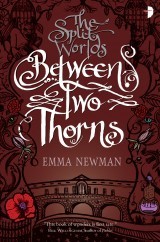
I've been a big fan of Emma Newman since I discovered her blog a few years ago, and I was lucky enough to meet her when she did a London book launch for From Dark Places , her collection of short stories.
For some time now, she's been releasing short stories set in her Split Worlds universe, and I hosted ' Cause for Complaint ' back in December 2011. I'm quite excited for the lovely lady because the first Split Worlds novel, Between Two Thorns, is due out soon!
The Blurb
Something is wrong in Aquae Sulis, Bath’s secret mirror city. The new season is starting and the Master of Ceremonies is missing. Max, an Arbiter of the Split Worlds Treaty, is assigned with the task of finding him with no one to help but a dislocated soul and a mad sorcerer.
There is a witness but his memories have been bound by magical chains only the enemy can break. A rebellious woman trying to escape her family may prove to be the ally Max needs. But can she be trusted? And why does she want to give up eternal youth and the life of privilege she’s been born into?
Emma's running some competitions for lucky readers. First off, if you pre-order a copy of Between Two Thorns you'll be entered into a prize draw. If you win, you’ll have a character named after you in "All Is Fair" – the third Split Worlds novel (released October 2013) – and a special mention at the end of the book. So how do you enter?
Pre-order a copy of the book from your favourite retailer (if you pre-order from Forbidden Planet you'll get a signed copy). If you order from Forbidden Planet or robottradingcompany.com (for ebooks) you don't need to do anything else – Angry Robot will take care of your entry for you. If you pre-order from anywhere else you'll need to email a copy of your order confirmation to: thorns AT angryrobotbooks.com and they'll assign a number to you.
Here are links to all the places you can pre-order:
Angry Robot Trading company – for DRM-free ebook
Amazon (paperback) UK
Amazon US
The Book depository (Worldwide free postage)
UK Edition
US Edition (bigger)
There are also two UK launches and an international one using the magic of telephone conferencing. All the details are here.

Published on February 26, 2013 01:00
February 25, 2013
NaNoReMo - Finished!
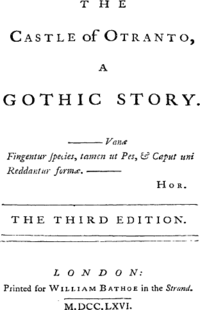
At the end of January, I announced that I'd be reading Horace Walpole's The Castle of Otranto for NaNoReMo. I updated on my progress a couple of weeks ago, and I'm pleased to say I've finished it. I'm glad about this for two reasons; on one hand, I'm glad I finished within the given month, and on the other, it became such a chore to read that I was glad it was finally over when I reached 'The End'.
I'd originally chosen The Castle of Otranto due to its privileged position within the canon of Gothic literature - it's considered by many to be the first gothic novel, and its lineage can be traced through both its literary and cinematic descendants. My copy is only 115 pages long, divided into five chapters, and that is 115 pages of hand wringing, melodramatics, and absolutely no indication of which character is speaking at any given time.
I said in my last update that "I know that storytelling has changed an awful lot in the 249 years since it was published but the novel feels more like a documentary than a work of fiction" and I stand by that. The entire novel is 'told' in the same breathless fashion as a rumour being repeated in a washroom, and the characters never get the opportunity to become anything other than one dimensional stereotypes. Even the villain is devoid of personality.
It's a shame because there is a good idea buried within the story. Manfred, the Prince of Otranto lives in fear that he will lose his principality unless he produces a son, and after his own son is crushed by a giant helmet that appears from nowhere, he contrives to divorce his wife, Hippolita, and marry Isabella, the princess intended for his son. A local peasant, Theodore, continually throws a spanner in the works, especially when he falls in love with Manfred's daughter, Matilda. There is a lot of running to and fro, with characters spending most of them time dashing off to the local convent, or disappearing somewhere to talk to someone else. At the same time, a group of knights arrived, bearing a sabre that matches the helmet that they dug up in the woods, and Manfred's servants see a spectral giant within the castle. The idea of the Prince desperately trying to outrun a prophecy becomes buried beneath the melodrama of the family relationships.
There are subterranean passages, mysterious knights, prophecies, long lost heirs, and intrigue, so this should have been an enthralling read. Later authors have taken these themes and run with them, so perhaps my disinterest in this book comes from an unfair comparison with later works, but I really didn't enjoy reading this at all. I truly envy Helen Howell for reading Dracula for NaNoReMo - now THAT is a gothic classic!

Published on February 25, 2013 02:38
February 22, 2013
#FridayFlash - Cara Vs The Rabids

The lift lurched to a halt between the 28th and 29th floors, pitching Cara to the floor. The impact caused her watch to stop at exactly 11:53pm.
She swore, but a stopped watch was the least of her worries. In a normal lift in a normal building, she'd try to contact someone, and wait for help. She call a friend to pass the time. But this was a lift in Coleridge House, a notorious tower block at the centre of a strip of no man's land between the affluent Shelley Vale and the derelict slums of Pelling. The area lost all mobile coverage months ago when a group of Ferals brought down the mast to sell for scrap metal. The cable for the lift’s emergency phone dangled out of the wall, its receiver long since gone. Cara pressed buttons but nothing happened. The only comfort was the emergency lighting - if the Rabids had cut the power to keep the lift dangling, she'd be in total darkness. This must be a power cut.
Cara paced inside the lift, suddenly sensitive to the acrid tang of urine in the warm air. She tried reading the graffiti scrawled on the walls but the incoherent threats made her more nervous. Her eyes returned to the roof hatch. In her mind, Rabids emerged from the sub-basement, skittering through the underground car park. They'd swarm up stained and stinking staircases, drawn by the scent of fear in the south-west elevator shaft.
Cara cursed her sister. If Penn hadn't met that waster at college, she never would have bounced down the social ladder. She'd never have landed in the cesspool that was Coleridge House and Cara wouldn't be stuck in a lift at seven minutes to midnight like a sacrificial lamb waiting for the priest to arrive.
Unwilling to wait for Death, Cara scrabbled at the tiny gap between the doors. Being a badly maintained lift in a crumbling tower block, the doors didn’t close fully before the lift moved, and Cara managed to wiggle her fingers into the space. She threw her weight backwards, heaving on the right hand door.
The doors parted with a protesting whine, and she eased them apart by a foot. The lift was stopped directly between the floors, too high for her to clamber up to crawl out onto the 29th floor. She’d have to go the other way. She tossed her bag out of the lift, and sat down, inching across the lift until her legs dangled into the gap. Cara wriggled forward, bending backwards to get her body between the 28th floor ceiling and the lift floor.
She slithered free, jarring her right knee as she landed. Cara snatched up her bag and looked around the corridor. More graffiti adorned the walls, and the air smelled of stale weed. A row of battered security doors faced her, barring access to the cramped and badly lit flats of the block. No inhabitants opened their doors – the whole floor had a peculiar, abandoned feel.
Cara walked towards the stairwell, and froze. Growling came from the darkness below, accompanied by a scent of old blood mixed with filth. The Rabids were loose. There was no way she could go downstairs.
Cara bolted up the stairs, taking them three at a time. She paused on her sister’s floor and heard snarling around the corner of the stairwell. The Rabids had swarmed up the four staircases and were now prowling the block looking for easy pickings, only the inhabitants were locked in their homes.
Which just leaves me.
Only one option remained, and Cara threw herself upwards with new speed. Frenzied snarls erupted below her, and the sound of talons on concrete made her blood run cold. They’d either heard or smelled her, and they were on their way.
She emerged on the top floor landing. Her muscles burned, screaming for rest, but her body refused, hypnotised by the growling behind her. A narrow ladder rested against the wall, and Cara clambered up. She threw open the door to the roof and pushed herself out into the open air.
The roof was a maze of TV aerials, ventilation shafts and broken tiles. White fingers topped by vicious talons closed around her right ankle, and the growl below turned to crazed laughter. Cara kicked down at her attacker, and the Rabid released its grip. Cara seized her opportunity and ran into the roof maze. She grabbed a broken aerial as she passed, determined to arm herself.
She found a solitary patch of moonlight between three air ducts. Her heart hammered as the Rabids swarmed across the roof. They prowled the perimeter of her space, snarling and snapping at each other. Cara clutched the aerial, her hands slick with sweat. Moonlight was only a weak reflection of sunlight, but she hoped it would be enough to deter the pack.
Over the next few hours, the Rabids maintained their distance, lunging whenever a cloud covered the moon. She lashed out with the aerial, sending them back to the pack where other Rabids would fight to lick the blood. An idea formed as the first flames of dawn licked at the eastern horizon.
Cara threw down the aerial and shouted a challenge. The need for blood outweighed their need to find shelter, and they continued to snarl. Rabids at the back fled, whooping as they raced down the stairs, eager to beat the coming sunrise.
Fires broke out among the pack on the roof as sunlight fell on the hunters. Soon Cara couldn’t see for the smoke, or hear anything besides the roar of the flames and the screams of the dying Rabids.
The smoke cleared at 7am, when a distant church tolled the hour. Cara stood surrounded by charred corpses and piles of ash. She picked her way across the roof, and clambered down the ladder. She paused by the south eastern lift and shook her head.
This time, she would take the stairs.
(Elevator photograph by Idac, graffiti added by me)

Published on February 22, 2013 03:01
February 18, 2013
Terry Deary wants to abolish libraries

Newcastle City Library
Last week, I spotted a tweet from Neil Gaiman, calling Terry Deary selfish and avaricious for his attitude towards libraries. He'd included a link to the Guardian's website, so I clicked through to have a look. What I saw shocked me. Deary appears to have a thing against libraries because they're losing him money. According to the article, his books were borrowed more than half a million times during 2011/12, and due to the Public Lending Right scheme, he only made £6,600 from those books. Had he sold them, he'd have made over £180,000. According to him, "The libraries are doing nothing for the book industry. They give nothing back, whereas bookshops are selling the book, and the author and the publisher get paid, which is as it should be. What other entertainment do we expect to get for free?"
His main gripes with libraries seem to revolve around cost - both the cost to the tax payer in keeping libraries open, and the cost to the authors and publishers who lose money when books are borrowed, not bought. It seems he puts his right to be paid above public access to information. To put it bluntly, what an arsehole attitude. I originally planned a post that would have potentially blistered paint, but I thought I'd break down his argument that libraries are bad, and explain what he's clearly missing.
1) Books as entertainment.
At one point, Deary makes the point that people wouldn't expect to go to the cinema for free, so why should we let them borrow books for free? The key thing that he's missing is that you cannot equate books with cinema. Books straddle both education and entertainment, and just as many people borrow non-fiction as they do fiction books. One wonders where he finds the books to do the research for his Horrible Histories series. But given the vast number of people who use services like Lovefilm or Netflix to watch films at home at a much lower price than the cinema, it seems Deary is a little behind the times regarding how people spend. Bottom line is, people just don't have that much money. Which leads me on to...
2) The cost of books.
In and of themselves, books are not expensive. However, if you're from a low income family, or you're a student, paying for all the books you want/need is going to get very expensive very quickly. Everyone knows I'm working on my PhD at the moment, and my current chapter is an overview of the horror film from 1897-1978. Just as an example, if I'd bought all the books I needed for a 1000 word section in that chapter on the giallo film, it would have cost me, at a minimum, £136.10. That's just for one small section of a single chapter. I can't afford that! But I can easily borrow the books from the library as and when required. Furthermore, Deary seems to believe that libraries are putting bookshops out of business but I'm sorry, both co-existed quite peacefully until the rise of online shopping. Stores like Amazon are putting bookshops out of business, simply because their product is cheaper. (Incidentally, I've found that the online prices at Waterstones match, and in some cases are lower than, Amazon's, so I've switched from buying at Amazon to buying at Waterstones).
3) Marketing.
Due to the cost of books, people might be put off buying, say, the first in a series in case they don't like it. But how many people might borrow the book from a library, discover they like it, and then go on to buy another book by that author? Allowing people to borrow books is a good way of 'hooking' readers and getting them to buy new books as they're released. I've sometimes borrowed books from libraries and enjoyed them so much that I've bought my own copy. After all, in an interview with the Evening Standard back in April 2012, he was backing a literacy campaign, saying he preferred children to discover his books themselves without being forced to read them by schools. Without libraries, how can children discover these books then? (As a side issue, he also backed a literacy campaign by saying children have never been more literate because they text and use Facebook. Has he ever actually seen a student's work? I suspect not.)
4) What about the other services?
Libraries don't just offer books any more - at our main City Library, they offer genealogy services, advice for small businesses, education facilities, conference space and a means of getting online. Deary needs to remember that not everyone has a computer at home, or they may not have an internet connection, and the only way for such people to get online is to use computers in a public space. Libraries are far nicer than internet cafes, and they can provide a lifeline to older people, giving them somewhere warm and welcoming to go to get them out of the house. Besides, if you need to get online and you have children, you can safely leave them in the children's section while you do your online errands. Without libraries, what would you do?
5) Other methods of obtaining books.
Really, if Deary is going to complain about libraries, then I'm assuming he also wants to see an end to secondhand bookshops, or books being sold in charity shops to raise money for good causes. Does he also want people to stop lending books to their friends? At least if people borrow from a library, he earns 6.2p every time they do so. If I bought one of his books at an Oxfam shop, he'd get nothing for it. In Deary World, do all people only buy their books from established bookshops? In fact, I wouldn't be surprised if Deary's favourite historical event was the destruction of the library at Alexandria.
Hundreds of authors have rallied behind the cause to save libraries, recognising the universal need for access to information - if the comments section is anything to go by, then so do most readers of the Guardian. Yes, authors and publishers need to make money but I really don't think that books being available in libraries is going to cause enough of a dent in earnings to make it necessary to abolish libraries altogether. I seem to be quoting this more often than not lately but Deary needs to remember that "The needs of the many outweigh the needs of the few, or the one", and as long as we live in a society where the have-nots outnumber the haves, then we need to provide education and information in an accessible, affordable way. If Deary doesn't like that, then I might suggest a change of career to one that will bring him into contact with as few people as possible.

Published on February 18, 2013 04:36
February 14, 2013
#FridayFlash - Rainy Day
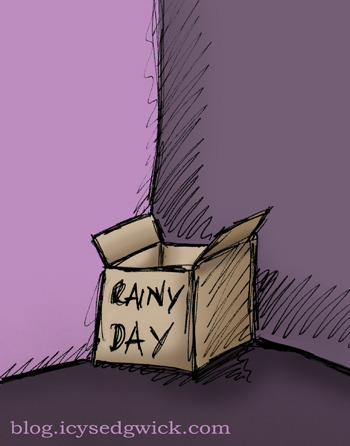
Celine sits on the station platform, waiting for her train to York. She fiddles with her hair and taps an irregular rhythm with her feet. The announcements board says the train is on time but it cannot come soon enough for Celine. Her Boyfriend promised her a day out in York, a city she has not visited in years, and she has not seen him in almost a month.
Her phone jangles in her pocket and she fishes it out, pulling free an assortment of tissues and old bus tickets as she does so. She sits among the detritus of her everyday life and opens a text from the Boyfriend.
"Hi C, sorry 2 do this, have been thinkin a lot lately & i don't think this is workin 4 either of us. Probs best u don't come 2 york".
Celine stares at the screen. Moments crawl by before her fingers shake themselves free of their stupor.
"But I'm already waiting for the train." She presses send.
"Sorry C. Really am. Just don't think we're rite 4 each other. Hope to stay friends, ur a gr8 girl."
Celine peers at the phone through a film of salt water. Her train pulls into the station but she doesn't see it. She wipes away the tears and re-reads the texts, hoping she made a mistake, or that he was joking. She starts to type four or five different replies, each time deleting the message in case another comes in explaining it all.
A station guard comes over after half an hour. He asks her if she needs help, and leads her out of the station. He looks at her kindly, like a grandfather indulging a child with a scabby knee. It only occurs to her later that she is probably not the first dumpee he has encountered at work. He even buys her a cup of coffee after a hatchet-faced woman in the station office refuses to refund her now-useless train ticket.
Her friends rally around, and try to take her mind off it. They do a reasonable job, and after a few months, Celine deletes the texts from her phone. She deletes all of his texts, both good and bad. She cannot stand to be reminded of the wonderful things he said before he became so cruel. She gets a new haircut and uploads the photo to Facebook. The Now-Ex-Boyfriend 'likes' it almost immediately, but she un-friends him as quickly, and clears out her cache of photographs. He ceases to exist in her life, both online and off. A nasty streak, buried deep within Celine, hopes that she has erased him from existence altogether. She never hears from him again - it could be true.
Two days later, Celine takes all of the feelings she ever had about him and packs them into a cardboard box. She writes 'Rainy Day' on the front in black marker, and stores it at the back of a closet. She doesn't know when, or if, she'll ever need them again. She pushes other boxes, containing clothes or books, in front of them, and vows to get on with her life.
It doesn't take long for the box to start rattling. Something inside it wants to break out.

Published on February 14, 2013 22:00
February 11, 2013
NaNoReMo update

At the end of January, I announced that I'd be reading Horace Walpole's The Castle of Otranto for NaNoReMo. I'd chosen it due to its privileged position within the canon of Gothic literature, and because many of its themes and motifs appear in later novels, and by extension, within the gothic mode of filmmaking.
It's not a long book - my copy is only 115 pages long - and I can only thank my lucky stars for that. I'm already about a third of the way through but it has not been a pleasure to get even that far. I know that storytelling has changed an awful lot in the 249 years since it was published but the novel feels more like a documentary than a work of fiction. Walpole almost exclusively 'tells' the story, rigorously ignoring any opportunities to 'show' what's going on, and the characters are almost entirely devoid of any depth.
In the story so far, the Prince of Otranto, a fairly odious and one-dimensional man named Manfred, has been anticipating the forthcoming wedding of his son, Conrad, to a princess named Isabella. Manfred is desperate to continue the family line to avoid a fatal prophecy, but before the marriage can take place, a giant helmet falls from the sky (yeah...what?!) and crushes Conrad. Manfred then decides to divorce his wife, Hippolita (a simpering woman continually described as being a paragon of virtue, who is so weak and pathetic you just want to slap her) in order to marry Isabella himself and thus produce more heirs. Isabella is having none of it, and escapes to a nearby convent through a rather convenient subterranean passage. All of this takes place within chapter one, and it's difficult to care what's going on when so much content is crammed into the story before you even know who anyone is.
It takes a lot for me to abandon a book, and I'd quite happily set this aside if a) it wasn't such a seminal text, meaning I feel like I have to read it, and b) it wasn't so short. I'm pretty sure I can whizz through the rest of it before the end of the month, and if I do...well I'll be switching to Edgar Allen Poe instead...

Published on February 11, 2013 03:08
February 8, 2013
#FridayFlash - We Could Be Heroes
"Ere, Simon, how do you know you can die?"
"What?"
"I said, how do you know you'll die? Or that you even can?"
"What are you on about now?"
"I was just thinking. You could have superpowers or something, so how do you know you even can die unless you try it?"
"Don't be stupid, everyone can die. It's a given."
"Yeah man, that's what they want you to think."
"Oh don't start with all your conspiracy theory rubbish. It's too early in the day for that."
"It's not a conspiracy theory. What if it turned out you'd gotten superpowers during the night and you were now invincible - how would you even know?"
"That's ridiculous."
"So come at it another way - we all reckon we can die because people keep doing it, but how do you know you actually will?"
"It's the natural law."
"But how do you know?"
"I don't, but I'm certainly not going to try it to check either way."
"You've got no vision, have you?"
"Well you do it then."
"Fine. I will."
"No! Don't! Don't jump out the-"
THUMP
"Eric? Eric?!"
"It's okay, I'm alright! I told you I couldn't die!"
"Oh don't be stupid. I just looked out - you landed in a dumpster!"
"What?"
"I said, how do you know you'll die? Or that you even can?"
"What are you on about now?"
"I was just thinking. You could have superpowers or something, so how do you know you even can die unless you try it?"
"Don't be stupid, everyone can die. It's a given."
"Yeah man, that's what they want you to think."
"Oh don't start with all your conspiracy theory rubbish. It's too early in the day for that."
"It's not a conspiracy theory. What if it turned out you'd gotten superpowers during the night and you were now invincible - how would you even know?"
"That's ridiculous."
"So come at it another way - we all reckon we can die because people keep doing it, but how do you know you actually will?"
"It's the natural law."
"But how do you know?"
"I don't, but I'm certainly not going to try it to check either way."
"You've got no vision, have you?"
"Well you do it then."
"Fine. I will."
"No! Don't! Don't jump out the-"
THUMP
"Eric? Eric?!"
"It's okay, I'm alright! I told you I couldn't die!"
"Oh don't be stupid. I just looked out - you landed in a dumpster!"

Published on February 08, 2013 01:06
February 1, 2013
#FridayFlash - Broken Bracelet
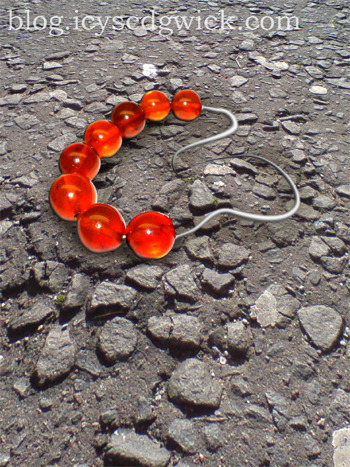
In the days following The End, a lot of people learned the value of what they'd lost. Law, order, social niceties, even electricity - all gone. Those disenfranchised by the old system turned feral, and formed the Riot Boys. The police, overrun and overworked, just gave up. It got worse. Even death offered no eternal peace, as the dead began to rise. It wasn't radiation, or a virus, just some quirk of reality that reversed some of the natural laws. Some of the revenants retained their previous selves, and went home. Some of them...well, they copied whatever behaviour they saw, and a lot of them saw nothing but Riot Boys. Humanity was beset on all sides - for the first time in my life, I was glad not to be human.
Oh I looked human. Most of the time. For three days out of the month, we were something else entirely. My family were Wulfen, and given there haven't been wolves in England for centuries, we'd become adept at avoiding detection. Being smaller and lighter than my brothers, I trained as a Tracker, and I was good at it. Very good. My brothers could have been jealous, but they had no other sisters, and protected me as the Warriors they were.
So it was that I came to be skirting the remains of an old village, late one spring evening. Some of those places avoided much trouble, being so far out of the way, and the inhabitants continued on much as they did before, growing their own food and bartering goods. They were always happy to see me, bringing with me news of the 'outside world'. Not all villages escaped, and the burnt out buildings of Woldendale put me on my guard. Riot Boys had been here - and might still be around.
I found myself in a pub car park on the edge of the village. The pub wasn't gutted by fire, but the windows were full of broken glass, the walls coated by thick graffiti. The Riot Boys probably drank it dry before they moved on. I lifted my head and let the scents of the air wash over me. Nothing - human or undead. I didn't think there was anything worth salvaging in Woldendale but I had to check.
I picked my way across the car park, and something shiny caught my eye. I padded closer, and saw the remains of a bracelet lying on the ground. Several cracked beads still clung to the nylon thread, although most of them had scattered across the tarmac. I picked up the fragile remains and sniffed, but heavy rain had washed away any traces of its owner. Now the bracelet just smelled of bad weather and petrol. I didn't have to be clairvoyant to see how it ended up here. Some hapless girl, perhaps eager to meet a boyfriend, ignored curfew and crossed the car park. With both revenants and Riot Boys in the area, she stood no chance. She encountered one or the other - or in a worst case scenario, both - and in the ensuing scuffle, the bracelet broke, and spilled its beads on the ground. I sighed. Nothing I could do for her now.
A scent caught my nose. Rotting flesh and hair gel – particularly cheap hair gel, considering its pungent aroma. I froze, trying to gauge the direction. Someone shambled out of an ancient lean-to at the back of the pub. He cut a strange figure, with his disintegrating skin, bloodshot eyes, and hair thick with styling product. He sported the typical spiky crop favoured by the Riot Boys, and was even clad in their tracksuit and trainers uniform. I could see acne scars among the patches of rot on his face – he couldn’t have been more than fifteen when he died.
He uttered a single moan and lurched towards me. I cursed myself for not keeping a weapon to hand, and scrabbled at the buckles on my bag. I backed away across the car park as the revenant ambled closer – not quite hurrying, but not taking his time either. I fumbled with the strap and the buckle finally gave. My foot caught on a pothole in the tarmac, sending me sprawling backwards. The flap of my satchel opened and scattered the contents of my bag across the car park.
The revenant smiled, a horrifying sight of missing teeth and misshapen lips, and bore down on me. I scrambled backwards, and my hand found smooth wood. My fingers curled around a handle and I swung upwards with all my strength as the revenant pounced. The head of my hammer collided with the revenant’s skull in an explosion of bone and blood. My would-be attacker keeled over, the hammer still buried in his brain.
I pulled the hammer free and wiped it clean on the revenant’s tracksuit top. I gathered the rest of my things and dumped them back in the satchel, ever mindful that where there was one revenant, there would no doubt be more.
A low moaning erupted within the lean-to. I recognised the sound – humans might think it a sound of mourning, but the moan, interrupted by snarls, was a revenant argument. They likely didn’t know I was there, but if they came outside, they would. My brothers would storm the building, slaughtering all the revenants they found, and they’d celebrate later with a feast of venison and ale.
But that was my brothers. I was on my own. I may be Wulfen but I wasn’t stupid. The revenants of Woldendale could wait. So I did the only thing I could. I ran.
* * *
Bracelet by L1l1th, tarmac by Blackcatm, edits by me. Concept of a broken bracelet in a car park from Nerine Dorman.

Published on February 01, 2013 04:38
January 30, 2013
What writers can take from Django Unchained

I finally got to see Django Unchained at the weekend, a film I'd been looking forward to for a long time since a) I love Westerns, b) I like Tarantino and c) I love Leo DiCaprio. My review is over on my film blog, but I had a few thoughts about what writers could take away from the movie.
1) Do your research.
The world of Django Unchained felt very plausible, and very real. At no point did I look at anything and think it was anachronistic, although while checking things for this post, I discovered that Tarantino has included dynamite some eight years before it was invented. Still, fiction is allowed to take some liberties, as long as they're within the bounds of possibility. The costumes were fabulous, the set design had a real attention to detail that period pieces always need, and Tarantino had clearly researched the social situation of 1858. No matter whether you're setting your story in 2087 or 1887, it needs to feel real to a reader. Even futuristic pieces need research to extrapolate the likelihood of possible inventions becoming reality.
2) Don't be afraid of controvery.
Don't feel you have to court controversy - for every person who reads your work out of genuine interest, you'll have another who reads it for its reputation, and that's a Pandora's box you don't want to open as you scrabble to top each controversial outing. Having said that, don't shy away from a topic because you feel it is, or might be, controversial. Fiction will always need brave authors willing to talk about things that no one else will discuss, and if you have an original, fair, or unique take on a subject, why not try it out? Tarantino certainly did. Whether he was right or wrong to do tackle the subject of slavery using the generic conventions of both the Western and the Revenge film so is not for me to decide, but kudos to him for having the balls to raise the topic in the first place.
3) Know when to end a scene.
There were more than a few scenes where I found myself mentally screaming "CUT! FOR THE LOVE OF ALL THAT IS HOLY, CUUUUUUT!" Tarantino's often had the tendency to ramble, letting scenes go on far longer than they need to, while the additional running time does nothing to further the story (although it may increase your need to duck out to the bathroom). As a reader, if you feel that a scene is going on too long you might just skip to the next one - or worse, you might put the book down altogether. Writers need to know when to stop a scene, or cut it entirely. If it doesn't further the plot or illuminate something important, lose it. If it feels like it's running out of steam, cut and get on with it.
4) Using up your big finish too early.
It wasn't one of his biggest hits but Death Proof got it just right when the climactic set piece, that epic car chase, was at the very end of the film. Likewise the fight sequence between the Bride and O-Ren Ishii in Kill Bill Pt I. Trouble is, I felt like Django Unchained's big shoot-out was the big set piece, as opposed to the actual climactic ending...meaning that the film after said shoot-out sagged a little. That would be like Luke destroying the Death Star and spending another forty five minutes wandering around. Keep your big finish for the end.
5) Give your hero flaws...but don't make him easy to dislike.
I think my biggest problem with Django Unchained is that I warmed to King Schultz very easily, and I really liked the character, but I found it nigh on impossible to root for Django himself. If your sole presented reason for me rooting for someone is how badly they've been treated by someone else then you're not exactly presenting a rounded character. Likewise, making the guy a natural shot so he's a better gunslinger than Wyatt Earp without any practice just makes me too incredulous. His motivations were understandable, and possibly even commendable, but as a character, I just didn't like Django. I know that, in places, Django himself was playing a character in order to further his own ends, but it didn't feel like Django was stretching himself too much to play a bastard. Schultz had flaws, but they were there to make him human. By contrast, Django's flaws just made him into a cartoon character. So by all means give your protagonist flaws - after all, we don't want yet another Mary Sue - but don't make them unlikeable in the process. Even anti-heroes like Snake Plisskin are likeable.
What do you think?

Published on January 30, 2013 00:00



